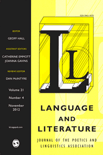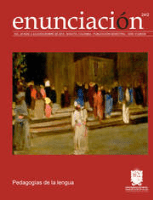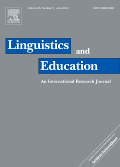
Language and Literature
Scope & Guideline
Cultivating Scholarly Exploration in Language and Literature
Introduction
Aims and Scopes
- Multimodal Literacy Education:
The journal emphasizes the importance of multimodal approaches in literacy education, exploring how various modes of communication (visual, auditory, and textual) can enhance learning experiences and outcomes. - Critical Pedagogy and Social Justice:
A core focus is on critical literacy practices that advocate for social justice and equity in education, examining how literacy can empower marginalized voices and challenge dominant narratives. - Transdisciplinary Perspectives:
The journal encourages transdisciplinary approaches to literacy, integrating insights from fields such as linguistics, sociology, and cultural studies to enrich understanding of literacy practices. - Cultural and Linguistic Diversity:
There is a consistent focus on the experiences of culturally and linguistically diverse learners, highlighting the significance of plurilingualism and cultural representation in literacy education. - Teacher Education and Professional Development:
The journal addresses the preparation and ongoing development of educators, exploring effective pedagogical strategies and frameworks to enhance teaching practices in language and literacy.
Trending and Emerging
- Digital Literacy and Citizenship:
A notable trend is the increasing focus on digital literacy, particularly in relation to teaching students about responsible online behavior and critical engagement with digital texts. - Plurilingualism and Multilingual Education:
Research on plurilingual and multilingual approaches in literacy education is gaining traction, highlighting the importance of leveraging students' diverse linguistic backgrounds in enhancing learning outcomes. - Critical Multimodal Literacy:
Emerging themes around critical multimodal literacy are on the rise, exploring how students can engage with and analyze various forms of media and texts in a critical context. - Community and Family Engagement in Literacy:
There is a growing emphasis on the role of families and communities in literacy development, recognizing the importance of home literacy practices and community resources in supporting children's learning. - Culturally Responsive Pedagogy:
The trend towards culturally responsive pedagogy is becoming increasingly significant, with research focusing on how educators can effectively integrate students' cultural identities into literacy instruction.
Declining or Waning
- Traditional Literacy Instruction Methods:
There appears to be a decline in research focused on traditional, prescriptive literacy instruction methods, as the journal shifts towards more innovative, context-sensitive approaches that emphasize critical thinking and creativity. - Standardized Assessment Practices:
Research centered on standardized literacy assessments is becoming less frequent, indicating a movement away from one-size-fits-all evaluation methods towards more personalized and formative assessment strategies. - Narrowly Defined Literacy Skills:
There is a decreasing emphasis on narrowly defined literacy skills, such as rote memorization and basic reading comprehension, in favor of broader, more holistic definitions that encompass critical and creative literacies.
Similar Journals

Tejuelo-Didactica de la Lengua y la Literatura
Fostering Dialogue, Advancing Knowledge.Tejuelo-Didactica de la Lengua y la Literatura, published by Junta Extremadura, Consejería Educación, is a prestigious open-access journal based in Spain that has been serving the academic community since its inception in 2008. With a focus on education, linguistics, and music, the journal proudly holds a strong position in the academic landscape, notably ranking in the top quartile (Q1) for both linguistics and music in 2023. Its impressive Scopus rankings further highlight its relevance, showcasing a remarkable 83rd percentile in the field of Arts and Humanities, particularly in Music. As part of the ongoing converged years from 2018 to 2024, Tejuelo aims to foster dialogue among researchers, educators, and practitioners, providing a platform for innovative research and insightful discussions that enhance the understanding and teaching of language and literature. By promoting scholarly exchange through open access, the journal plays a vital role in advancing knowledge and practices in its fields, making it an essential resource for students and professionals alike.

Journal for Multicultural Education
Fostering inclusive dialogues for a globalized society.Welcome to the Journal for Multicultural Education, an esteemed publication by Emerald Group Publishing Ltd, dedicated to advancing knowledge and practice in the dynamic fields of Cultural Studies, Education, and Linguistics. Since its inception in 2014, this journal has established itself as a leading forum for research, reflection, and discourse, addressing the multifaceted experiences of diverse cultures in educational contexts. With a commendable Scopus Rank placing it in the 87th percentile for Cultural Studies, the journal is positioned in the Q1 quartile, making it a premier outlet for scholars and practitioners looking to contribute to and engage with cutting-edge research. Our commitment to fostering an inclusive dialogue on multicultural education equips our readers with innovative strategies and insights essential for navigating today’s globalized society. While the journal operates under standard access provisions, we invite researchers, educators, and students alike to explore the rich tapestry of scholarly works published within these pages, and partake in a vibrant community dedicated to transformative education.

Argentinian Journal of Applied Linguistics
Enhancing language education through cutting-edge research and insights.The Argentinian Journal of Applied Linguistics is a prominent publication dedicated to advancing the field of linguistics with a particular focus on practical applications within various contexts. Published by the Federación Argentina de Asociaciones Profesionales de Profesores de Inglés (FAAP), this journal serves as a vital platform for researchers, educators, and linguistics professionals interested in the nuances of language teaching, acquisition, and sociolinguistics. With an ISSN of 2314-3576, the journal showcases original research and reviews that push the boundaries of current knowledge and practice in applied linguistics. Despite being in its early stages, the journal aims to build a strong academic presence by fostering collaboration among scholars and practitioners, thereby contributing to the enhancement of language education in Argentina and beyond. The importance of this journal lies not only in its commitment to accessibility and knowledge dissemination but also in its role as a bridge between linguistic theory and practical application, ultimately benefiting educators and learners alike.

AAA-ARBEITEN AUS ANGLISTIK UND AMERIKANISTIK
Exploring the Depths of Linguistics and LiteratureAAA-ARBEITEN AUS ANGLISTIK UND AMERIKANISTIK, published by GUNTER NARR VERLAG, is a distinguished journal catering to the fields of Linguistics, Language, Literature, and Literary Theory. With its ISSN 0171-5410, this quarterly publication has been a vital resource for scholars since its inception in 2002 and is set to continue until 2024. Situated in Germany, it ranks in the Q3 category for Linguistics and Language and Q2 for Literature and Literary Theory as of 2023, indicating its significant contribution to these disciplines. Despite being non-open access, the journal is recognized for its scholarly rigor, boasting impressive Scopus ranks in both Arts and Humanities and Social Sciences, which underscores its relevance and impact. By fostering comprehensive discussions and analyses of English and American literature, as well as linguistic phenomena, AAA-ARBEITEN AUS ANGLISTIK UND AMERIKANISTIK serves as an essential platform for academics, professionals, and students aiming to deepen their understanding and research in these critical fields.

Enunciacion
Advancing dialogue through linguistics and education.Enunciacion is a prestigious academic journal published by Universidad Distrital Francisco José Caldas, focusing on linguistics, communication studies, and educational research. Since its inception in 1996, this open access journal has been committed to disseminating high-quality, peer-reviewed research that advances scholarship in these fields. The journal is based in Bogotá, Colombia, and serves as a vital platform for scholars, educators, and practitioners to share innovative ideas and findings. With an emphasis on promoting dialogue across diverse cultures and perspectives, Enunciacion plays a crucial role in fostering collaboration and knowledge exchange among researchers. Stay updated with the latest research by exploring its extensive archives, accessible to all. Our commitment is to enrich the academic community and contribute to the ongoing development of linguistics and education worldwide.

Literacy Research and Instruction
Empowering educators with evidence-based insights.Literacy Research and Instruction is a prestigious scholarly journal dedicated to advancing the field of education, with a particular emphasis on literacy research and pedagogical strategies. Published by Routledge Journals, Taylor & Francis Ltd in the United Kingdom, this journal has established itself as a significant resource for scholars, educators, and practitioners engaged in the intricate processes of learning and language acquisition. With an impressive impact factor and a well-regarded position in the Q1 category of Linguistics and Language and Q2 in Education, it is ranked highly among its peers, both in Scopus Ranks and overall academic impact. The journal covers a broad range of topics in literacy education, making it essential reading for those conducting innovative research and seeking evidence-based instructional practices. By providing valuable insights and fostering scholarly discourse, Literacy Research and Instruction plays a vital role in shaping effective literacy education practices worldwide.

Contexto-Revista do Programa de Pos-Graduacao em Letras
Engaging Minds with Original Research and InsightsContexto-Revista do Programa de Pos-Graduacao em Letras is a distinguished open-access journal published by UNIV FEDERAL ESPIRITO SANTO since 2013, effectively contributing to the academic discourse in the field of Language and Literature studies. With its ISSN 2358-9566, this journal offers a platform for researchers, professionals, and students to disseminate and access high-quality scholarly articles that explore various themes in linguistics, literary analysis, and cultural studies. The journal facilitates intellectual exchange within the Brazilian and global academic communities, emphasizing the importance of open access to foster collaboration and innovation in the humanities. By publishing original research, book reviews, and theoretical discussions, Contexto aims to enhance the understanding of language as a vital component in shaping cultural narratives. Its commitment to accessibility ensures that valuable contributions to the field are readily available, serving a diverse audience eager to engage with contemporary issues in letters.

Journal of Language and Literacy Education
Advancing Knowledge in Language Acquisition and Literacy DevelopmentThe Journal of Language and Literacy Education, published by the University of Georgia, College of Education, is an essential resource for researchers, educators, and students engaged in the dynamic field of language and literacy. With an ISSN of 1559-9035 and a commitment to open discussions on contemporary educational practices, this journal aims to bridge the gap between theory and practice, fostering innovative pedagogical approaches that resonate with diverse learning communities. Operating from 427 Tucker Hall, Athens, GA 30602, the journal holds a notable position in the Social Sciences - Education category, ranked at #854 out of 1543 in Scopus, with a 44th percentile standing. Spanning a converged period from 2020 to 2024, it offers a platform for cutting-edge research, critical reviews, and discourse surrounding language acquisition, literacy development, and educational strategies. Engaging with this journal not only enriches academic pursuits but also elevates professional practices within the field.

British and American Studies
Fostering Innovation in Cultural Studies and LiteratureBritish and American Studies, published by EDITURA UNIV VEST, is a pivotal open-access journal that fosters scholarly discourse in the fields of Cultural Studies, Linguistics, and Literature. Established with the aim of bridging gaps between British and American socio-cultural contexts, the journal provides a platform for researchers, professionals, and students to explore complex themes through critical analysis and innovative perspectives. With its ISSN 1224-3086 and E-ISSN 2457-7715, the journal has maintained an impressive impact factor, achieving ranking in Q2 and Q3 quartiles as of 2023 across multiple categories, positioning itself as a relevant voice in the academic community. As an open-access publication since 2015, it endeavors to ensure that research is available to a broad audience, thereby enhancing the dissemination of knowledge within the humanities. As it converges towards its future goals from 2018 to 2024, "British and American Studies" continues to invite transformative and enterprising contributions that challenge existing paradigms and fuel academic inquiry.

Linguistics and Education
Bridging Language and Learning for Future GenerationsLinguistics and Education, published by Elsevier, is a premier journal dedicated to advancing the understanding of the intersections between linguistics and educational practices. With its ISSN 0898-5898 and E-ISSN 1873-1864, this journal has established itself as a significant platform since its inception in 1988, continuing to produce impactful research up to 2024. It enjoys a prestigious Q1 ranking in both the Education and Linguistics and Language categories, reflecting its high-quality contributions and leading role in the field. The journal’s Scopus rankings further underscore its influence, being placed in the 87th percentile for Arts and Humanities in Language and Linguistics, and the 86th percentile in Social Sciences in Linguistics and Language. Although it operates under traditional subscription access, its contributions are essential for researchers, professionals, and students alike, making substantial strides in the understanding of language, learning environments, and pedagogical strategies. The journal's objective is to foster interdisciplinary dialogue and disseminate innovative research that informs educational policy and practice.